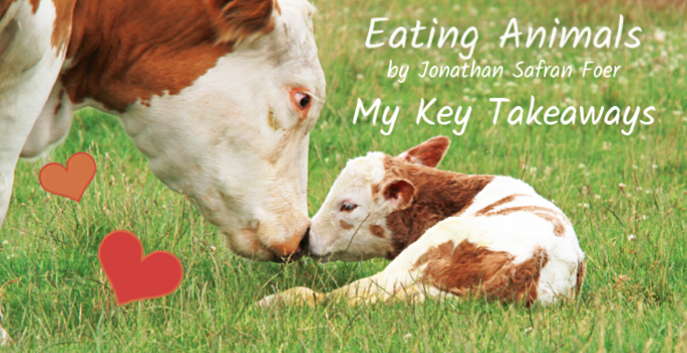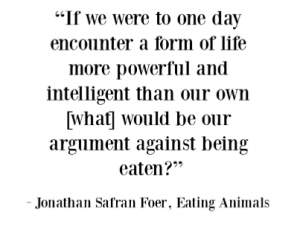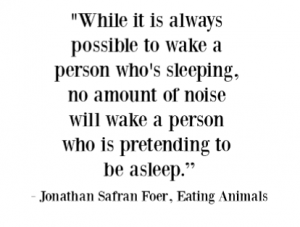This quote, from Eating Animals by Jonathan Safran Foer, is my favorite remark from his detailed story and personal account of everything that is wrong with today’s modern way of producing and eating meat. The book is Foer’s examination of factory farming; the suffering of sentient beings, morality of humans and their willingness to do nothing, and the impact behind the culture of food. The idea of this book, and the three year long journalistic research that went into it, was thought of by Foer after he pondered of what his unborn child’s diet would be like.
The first chapter of the novel discusses the way he grew up with food- feeling particularly puzzled by the idea of eating animals after his babysitter told him she “didn’t want to hurt anything” after he asked why she wasn’t eating chicken with them during dinner. He continues to talk about his struggles with identity growing up- constantly switching between a vegetarian diet and omnivorous diet “in an effort to claim some identity in a world full of people whose identities seemed to come effortlessly”. He even goes on to share that he would use the label as a way to get closer to other activist women.
I felt particularly connected to this part of his story, and I think it is an underrated part of his book that goes overlooked by a lot of readers. This question of identity, and how being vegetarian was a way for him to feel closer to himself- but not actually committing to the cause-was something I struggled with a lot in my early years of activism.
In and out of high school I constantly jumped between a vegetarian diet and omnivorous diet. I knew that eating animals and contributing to mass murder was wrong, but the connection was not there. It would not stick with me because I refused to put myself in the position of those I was inflicting harm upon. Foer brings this idea to light, explaining how humans are choosing to forget the process in which our meat is formed and connecting them to our own animality.
It’s at this point in the novel that Foer introduces the word anthropodenial; which to me is the most compelling and true theme that I took away from his story. Anthropodenial is essentially the blindness of not seeing human like characteristics in animals, and the animal-like characteristics we all have in us.
Foer poses this questions to humans; what is the true difference between us and animals, and why is it okay to torture and eat one but not the other? Foer continues on to discuss that humans at one point were also called animals, and that we are indeed members of an the animal kingdom despite cultures and families having their own understanding as to the actual definition of what an animal is.
The opposite of anthropodenial is anthropomorphism– the urge to project human experience onto other animals. Foer uses this word to explain how it feels to imagine yourself in the position of all the animals getting tortured day after day.
After introducing this concept, Foer then goes on to explain the harsh realities of factory farms; this included him actually visiting a ‘natural’ farm to gain first hand experience to the cruelty that ensues there. Within the first few minutes of being there Foer noticed the disgusting conditions of these animals, seeing dead birds piled atop each other with some “as desiccated and loosely gathered as small piles of dead leaves.”
This is just one of the examples of animal cruelty and harsh conditions that Foer explores in this book. He continually reports on his research of animal conditions on farms and even has a whole chapter dedicated to the different terms one uses when involved in the factory farming business like broiler chickens (responsible for providing flesh and grow more than twice as large in half the time of a normal chicken) and battery cage chickens (responsible for producing egg outputs that have more than doubled since the 90s).
He uses these factory raised chickens in an analogy he poses to get people to imagine themselves in these gruesome circumstances. He asks his readers step their mind into an overcrowded elevator and imagine that it is so cramped that you cannot turn around without bumping into your neighbor. Imagine that the elevator is so crowded you are often lifted from the ground, but this is “kind of a blessing” as the floor is made of wire which cuts and digs into your feet. During this occupancy, your neighbors will become violent and mad being deprived of food, more often than not turning cannibalistic.
As much as this information is shocking, it is not new. People have been studying animal agriculture for a long time, and there have been countless books and movies regarding this subject of the way our meat is produced like Eric Schlosser’s ‘Fast Food Nation’. So why do people still choose to eat this way, despite the ramifications that come from it? Not just moral ramifications, but global warming and health problems are involved too.
I can’t say if Foer even answered this question in his writing, because I don’t think anyone has the true answer. Foer explains it in the sense that there are two sides to every story and you should look at both sides before choosing what you consume. Everyone only wants to look at the positive side of eating meat, the only good thing being the sensation we get from the taste of it. Rather than the negative side which includes more than just one factor but comes down to one thing- the suffering and pain these sentient beings experience is ignored for the sake of or pleasure.
Author Bio- Angelina Matey is a Chico State student studying journalism and women’s studies. She is interested in animal activism and environmentalism, but is also dedicated to many movements involving social justice and gender equity.




1 comment for “Eating Animals by Jonathan Safran Foer- My Thoughts”